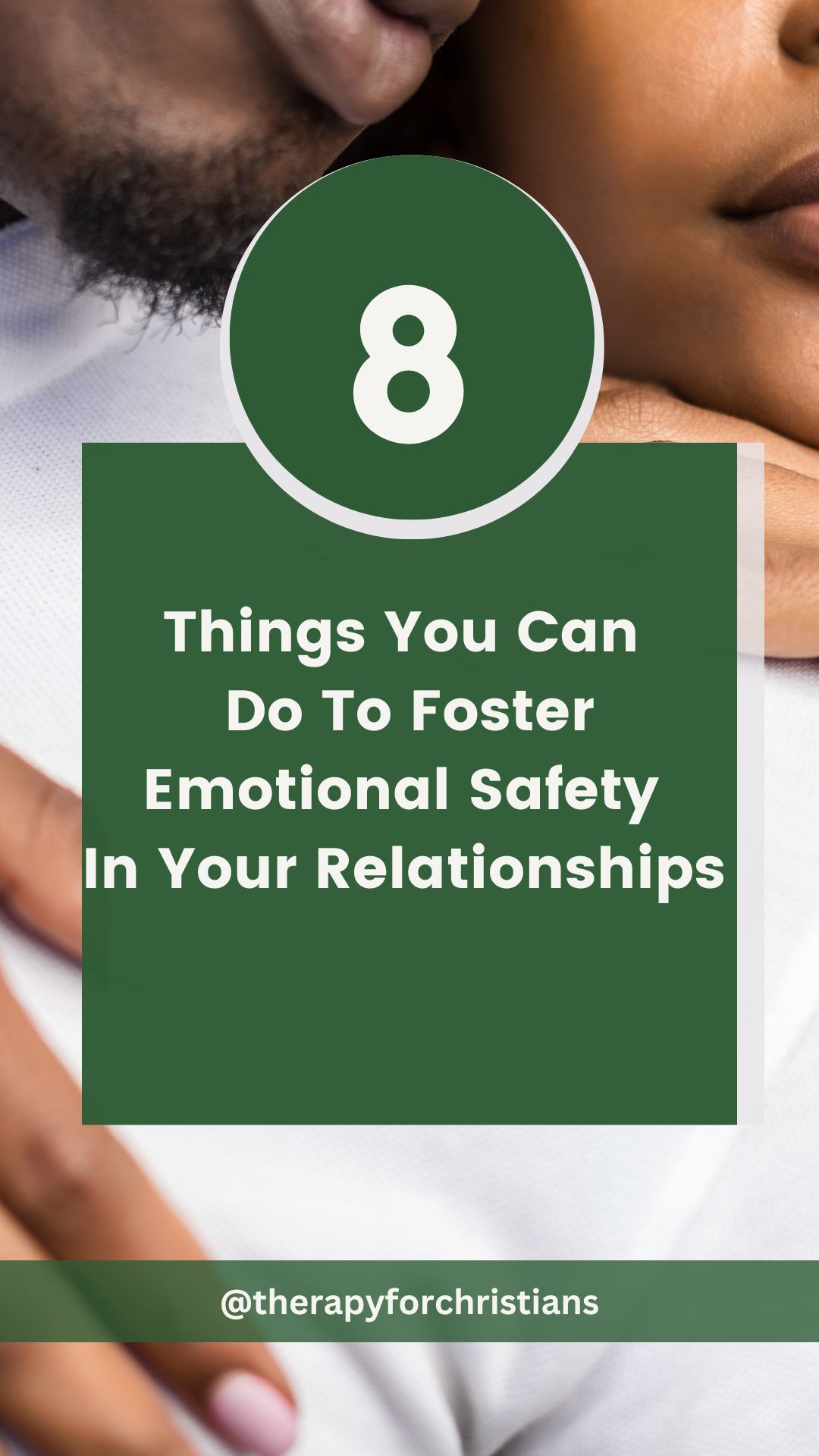

Emotional safety is a basic human need and an essential building block for all healthy human relationships, which is why this article will provide you with valuable tips and insight on how to establish emotional safety in your relationships and your life.
What is Emotional Safety?
Emotional safety refers to a sense of security and comfort that individuals feel in their personal and interpersonal relationships. It is the feeling of being able to express oneself without fear of judgement, rejection, or ridicule. When you are safe emotionally in a relationship, your emotions and thoughts are respected and validated by others, and there is a sense of trust and mutual understanding in the relationship.
A lack of emotional safety can arise from a variety of factors, including a history of trauma or abuse, unresolved conflicts, poor communication, or a lack of trust. A lack of emotional safety can lead to feelings of anxiety, stress, disconnection, or defensiveness, and can prevent individuals from fully expressing themselves or connecting with their partner on a deeper level.
What are Some Characteristics of Emotional Safety?
Some characteristics of emotional safety include:
Open communication: In an emotionally safe relationship, both partners feel comfortable expressing their thoughts and feelings without fear of judgment or criticism.
Trust: Emotional safety is built on a foundation of trust. Both partners trust each other to be honest, respectful, and supportive.
Empathy: Empathy is an essential characteristic of emotional safety. Partners in an emotionally safe relationship are able to put themselves in each other's shoes and understand their perspectives.
Validation: Emotional safety involves validating each other's feelings and experiences, even if they don't always agree. Partners feel heard, understood, and respected.
Boundaries: In an emotionally safe relationship, both partners respect each other's boundaries and communicate them clearly.
Support: Emotional safety requires both partners to be supportive of each other, even during difficult times. Partners provide emotional support and encouragement to each other when needed.
Acceptance: Emotional safety involves accepting each other for who they are, without trying to change them. Partners feel comfortable being themselves around each other, without fear of judgment or rejection.
Comfort: Providing comfort involves creating a safe and supportive environment where people feel validated and understood. When we provide comfort to someone, we are acknowledging their feelings and offering them support, empathy, and understanding. This can help to reduce anxiety and stress, increase feelings of well-being, and enhance the sense of emotional safety.
Overall, emotional safety is characterized by a supportive, respectful, and accepting relationship environment, where both partners feel valued and loved.
Why is Emotional Safety Important?
According to the latest research in neurobiology, emotional safety is crucial for establishing a fulfilling and satisfying connection in a loving relationship. Before we can be vulnerable with our partner, we must feel safe and secure in the relationship. As Brené Brown has emphasized, "vulnerability is the birthplace of love, belonging, joy, courage, empathy, accountability, and authenticity." Therefore, emotional safety must be prioritized to cultivate healthy and intimate relationships.
Without emotional safety, you are unlike to experience emotional health (i.e., you are more vulnerable to mental illness, including depression and anxiety). In addition, you cannot love well or walk in the life that God is calling you to live. When emotional safety is lacking, you may struggle to feel close to your partners and experience a sense of discomfort or unease in their presence.
There are other reasons why emotional safety is important:
It fosters trust: Emotional safety is a prerequisite for building trust in a healthy relationship. When individuals feel safe to express their thoughts and feelings, they are more likely to be vulnerable and open with their partner, which can help build a deeper connection and trust in the relationship.
It promotes communication: Emotional safety encourages open communication, where both partners feel comfortable expressing their needs, wants, and concerns. This can help prevent misunderstandings, conflicts, and resentment in the relationship.
It supports mental health: Emotional safety is crucial for maintaining good mental health. When individuals feel emotionally unsafe, they may experience anxiety, stress, or depression, which can negatively impact their overall wellbeing. In contrast, emotional safety can promote feelings of security, happiness, and contentment.
It strengthens intimacy: Emotional safety is essential for building intimacy in a relationship. When individuals feel emotionally safe, they are more likely to engage in meaningful conversations, share their deepest thoughts and feelings, and engage in physical intimacy with their partner.
It creates a positive relationship environment: Emotional safety promotes a positive relationship environment, where both partners feel valued, respected, and loved. This can help build a healthy and fulfilling relationship, where both partners can thrive emotionally and mentally.
What Does the Bible say about Emotional Safety
The Bible does not specifically use the term "emotional safety," but it Like this Content on Facebook does provide guidance and principles related to emotional well-being and healthy relationships.
Like this Content on Facebook does provide guidance and principles related to emotional well-being and healthy relationships.
For example, in Ephesians 4:26-27, it says, "In your anger do not sin": Do not let the sun go down while you are still angry, and do not give the devil a foothold." This passage emphasizes the importance of managing one's emotions in a healthy way, and resolving conflicts in a timely manner to prevent further harm.
In Proverbs 17:17, it says, "A friend loves at all times, and a brother is born for a time of adversity." This verse highlights the importance of supportive relationships and the role they play in promoting emotional well-being.
In 1 Corinthians 13:4-7, it says, "Love is patient, love is kind. It does not envy, it does not boast, it is not proud. It does not dishonor others, it is not self-seeking, it is not easily angered, it keeps no record of wrongs. Love does not delight in evil but rejoices with the truth. It always protects, always trusts, always hopes, always perseveres." This passage describes the qualities of healthy love, including trust, protection, and perseverance.
Overall, the Bible emphasizes the importance of love, forgiveness, and healthy relationships in promoting emotional well-being and creating a sense of safety and security in our lives. It is also important to remember that God wants us to experience emotional safety and has given us tools to achieve it.
8 Ways to Cultivate Emotional Safety in a Relationship
Creating emotional safety in a relationship involves building trust, respect, and communication. Here are some ways to build emotional safety in your relationship:
Give Your Partner the Benefit of the Doubt:
Giving your partner the benefit of the doubt builds trust, compassion, understand and emotional safety. Even if they don't understand, those who give their partners the benefit of the doubt presume good intentions. This prevents assumptions and negative judgments that can create emotional distance and tension in a relationship.
For example, if a partner forgets an important event or engagement, instead of immediately assuming that they didn't care or were being disrespectful, giving them the benefit of the doubt would mean assuming that they simply forgot and didn't mean to cause any harm. By choosing to see their partner's actions in a positive light, individuals can prevent misunderstandings and negative emotions from escalating.
Practice Active Listening:
One of the most effective ways to create emotional safe relationship is to practice active listening. Active listening involves fully focusing on what your partner is saying without interrupting or judging them. It's important to validate their feelings and make them feel heard. This can help build trust and encourage open communication in the relationship.
To engage in active listening, it's important to attentively listen to your partner's words, maintain eye contact, and ask relevant questions to demonstrate your understanding. By actively receiving and processing what your partner is saying, you can create a safe and supportive space for them to communicate in the future.
Communicate Clearly and Respectfully:
Clear and respectful communication is essential for creating emotional safety in a relationship. It's important to be honest and transparent in your communication with your partner. Avoid being defensive or critical, and instead, express your thoughts and feelings in a calm and respectful manner.
Show Empathy and Understanding:
Showing empathy and understanding for your partner's feelings and experiences can help create a sense of emotional safety in the relationship. Try to put yourself in their shoes and understand their perspective. This can help build a deeper connection and foster a supportive and compassionate environment.
Establish and Respect Boundaries:
Establishing clear boundaries in your relationship and respecting each other's boundaries is crucial for creating emotional safety. This can help build trust and respect in the relationship, and ensure that both partners feel safe and comfortable.
Express Appreciation and Gratitude:
Expressing appreciation and gratitude for your partner's efforts and contributions in the relationship can help build a positive and supportive environment. This can help both partners feel valued and loved, and create a deeper sense of emotional safety in the relationship.
Prioritize Self-care:
Taking care of yourself physically, emotionally, and mentally is essential for creating emotional safety in a relationship. When you prioritize self-care, you can show up as a more secure and grounded partner in the relationship, and build a deeper connection with your partner.
Seek Professional Help:
If you are struggling to build emotional safety in your relationship, seeking professional help can be a valuable resource. A therapist can provide guidance and support to help you establish a healthy and fulfilling relationship, and help you work through any challenges that may arise.
Final Thoughts On Creating Emotional Safety
In conclusion, emotional safety is a crucial component of a healthy and fulfilling relationship. It requires building trust, open communication, empathy, validation, boundaries, support, and acceptance. Lack of emotional safety can lead to negative impacts on mental and emotional wellbeing, including anxiety, stress, depression, and even emotional abuse. It is essential to cultivate emotional safety in a relationship by practicing active listening, clear and respectful communication, showing empathy and understanding, setting boundaries, and creating a positive relationship environment. By doing so, individuals can create a strong foundation of trust and intimacy in their relationship, leading to a healthy and satisfying partnership.
Before you leave, we would appreciate it if you helped us spread the word by sharing, tweeting, pin, etc. this post.
About the Author:
 Corine Williams, Ph.D. is Clinical Psychologist that is currently seeing clients in the States of Maryland, New Jersey, and New York. You can find out more about her practice by visiting www.therapyforchristians.com/corinewilliams. In addition to providing individual therapy, Dr. Williams is also passionate about writing books and designing merchandise that educate, uplift, and normalize mental health subject in the Christian community. You can find out more about her at www.booksbycorine.com or by visiting her amazon profile here: https://www.amazon.com/Corine-Hyman/e/B00AWZ5FL2
Corine Williams, Ph.D. is Clinical Psychologist that is currently seeing clients in the States of Maryland, New Jersey, and New York. You can find out more about her practice by visiting www.therapyforchristians.com/corinewilliams. In addition to providing individual therapy, Dr. Williams is also passionate about writing books and designing merchandise that educate, uplift, and normalize mental health subject in the Christian community. You can find out more about her at www.booksbycorine.com or by visiting her amazon profile here: https://www.amazon.com/Corine-Hyman/e/B00AWZ5FL2
Help us increase mental health awareness in the Christian community by donating through our paypal link here: www.paypal.com/therapyforchristians, joining our mailing list by clicking below, or join our provider list here: Provider listing
Disclaimer: the information, including but not limited to, text, graphics, images and other material contained on this article are for informational purposes only. No material on this site is intended to be a substitute for professional medical advice, diagnosis or treatment. If you are looking for a Christian counselor near you, please check out our directory located here: Christians Therapist Near Me
Featured Christian Therapists
Specialty Psychiatrist or Nurse Practiti... Located in Spartanburg, SC
View Listing.png)
)-(1).jpg)











